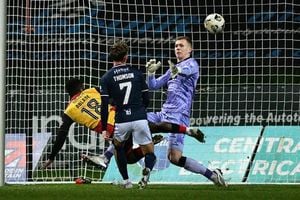A lively debate is currently sweeping through Argentina, especially as it ties closely to the even more vibrant culture of football. At the heart of this conversation is the new president, Javier Milei, who's pushing for radical changes to the way local football clubs operate, aiming to transform many of them from their current non-profit models to for-profit corporations. This proposal isn't just stirring up discussions at sports bars and cafes; it's igniting passion among fans and players alike, prompting them to reflect on what football means to their communities.
The soccer scene in Argentina is legendary. Known for producing some of the sport's brightest stars like Diego Maradona and Lionel Messi, the country holds football at its core, binding its citizens together through the shared excitement of the game. Gabriel Nicosia, a devoted fan of the San Lorenzo club, sums it up well: "When I come here, I meet my childhood friends. It's a fundamental pillar of everyday life." For him and many others, the connection to local clubs transcends the game itself—these organizations provide scholarships to underprivileged youths, support local activities, and contribute to the community's identity.
But with Milei's vision, there are fears. Supporters of existing clubs worry about the consequences of privatizing these entities, as Milei has proposed to allow football clubs to transition to strictly business-oriented ventures. Imagine the community involvement, they fear, dissolving under the weight of profit margins and shareholder interests. Advocates like Nicosia express hope but concern, wishing for a balance between profits and public good.
During his election campaign, Milei made headlines by emphasizing the success of Buenos Aires powerhouse Boca Juniors when he argued, "No one cares who the owner is if you beat [arch-rivals] River Plate 5-0." Here, he's indicating his belief: winning matters more than the source of funding. By comparing local teams with globally recognized clubs owned by wealthy investors, Milei presents the for-profit model as the route to competitiveness. Yet, this notion does not sit well with many club loyalists, who prefer the current system, where individual members have voices and shares, ensuring the clubs stay intertwined with their local identities.
This push for change is not without its challenges. Recently, the Argentine Football Association (AFA), led by Claudio Tapia, openly defied Milei's call for transformation. Tapia has staunchly defended the clubs' traditional models, expressing, "Our club belongs to its people, its members and its partners who make it greater each day," which resonates with many who see this as not just about football but about preserving Argentina's cultural fabric. The president's push has sparked legal battles as well, with courts intervening to freeze Milei's decree aimed at shifting club ownership structures, pending the outcome of challenges brought forth by the AFA.
The tension extends beyond Argentina's borders, too. The wider Latin American region has seen similar shifts, with Brazil recently allowing private ownership of clubs and Uruguay adopting comparable models. While some perceive this as necessary adaptation to remain competitive on the larger stage, those against it warn against losing sight of the social roles played by clubs.
Tensions continue to rise. Milei has pledged to investigate alleged financial irregularities within the AFA, intensifying the battle between his administration and the football authorities. Public sentiment leans heavily against the president's vision, as recent polls suggest more than 60 percent of Argentines involved with football prefer retaining the traditional ownership model.
Meanwhile, the economic backdrop to these developments is troubling. Since taking the reigns, Milei's government has been marked by austerity measures aimed at curtailing inflation, which recently soared, reaching nearly 237 percent annually. Many citizens find their finances tightening, with poverty rates climbing as subsidies and jobs vanish. Amid these struggles, Milei's predictions of forthcoming prosperity feel at odds with the daily realities faced by most Argentines.
At public forums, Milei promises tax reforms. He claims he will reduce the nation’s export taxes significantly starting in 2025, luring potential investors with the idea of promising returns. His administration seems set on economic recovery, rooting the lack of local investment as one reason behind the pitfall the clubs have fallen. Yet numerous voices, from sports sociologists to club leaders, raise concerns—what happens to social initiatives when the focus shifts to profit? Will fans still stand by clubs if community support dwindles?
On the other side, advocates for the change argue it is necessary to modernize football management. Some clubs, staring at deficits and diminished revenues from dwindling merchandise sales and membership fees, view Milei’s platform as the path to financial stability. Estudiantes, another significant club with former international Juan Sebastián Verón at its helm, is reportedly considering this hybrid model. Verón contends adapting may be the only way forward to keep clubs afloat, combining the best of both worlds—a commitment to social responsibility interlaced with private investment.
So what’s next for Argentine football? Will the government and AFA reach some sort of compromise, or will fans watch anxiously as the game they love transforms irreversibly? Only time will tell as the fervor of the fans mingles with the ambitions of politics and business—where exactly is the balance struck between tradition and modernity? Amidst uncertainty, the passion surrounding Argentine soccer remains as vibrant as ever, standing as a reminder of what is truly at stake.



